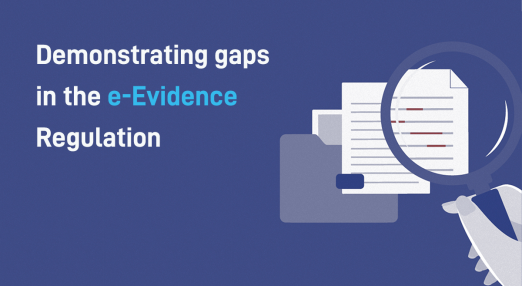Highlights
Filter by...
-

EDRi-gram, 17 November 2021
Check out our joint call to the Portuguese government to oppose a proposed law that tries to sneak in biometric mass surveillance. In this edition, we also explain how Facebook's latest announcement about deleting their facial recognition database demonstrates that voluntary self-regulation from tech giants is superficial and cannot replace actual legislation against these practices. And discuss the shortcomings of Facebook whistleblower's testimony.
Read more
-

EDRi urges Portugal government to oppose proposed video surveillance law
EDRi member and Reclaim Your Face lead organisation D3 (Defesa Dos Direitos Digitais) are raising awareness of how the Portuguese government’s new proposed video surveillance and facial recognition law – which Ministers are trying to rush through the Parliament - amounts to illiberal biometric mass surveillance. It also endangers the very foundations of democracy on which the Republic of Portugal rests.
Read more
-

Artificial intelligence – a tool of austerity
This week Human Rights Watch published a much-needed comment on the EU’s Artificial Intelligence Regulation. As governments increasingly resort to AI systems to administer social security and public services more broadly, there is an ever-greater need to analyse the impact on fundamental rights and the broader public interest.
Read more
-

EDRi-gram, 3 November 2021
In this edition of the EDRi-gram, we share EDRi's guide to help Members of the European Parliament make strong human rights choices regarding the Digital Services Act amendments prior to the IMCO vote. We also share the unfortunate news of how Europol's unfettered and problematic data-driven model of policing has been given the green light, which will lead to serious risks of discrimination based on race, socio-economic status or class, and nationality.
Read more
-

EDRi-gram, 20 October 2021
In this edition of the EDRi-gram, we share the launch of a collection of four scenarios that describe situations involving cross-border access to personal data and explains the necessary safeguards needed in the e-Evidence Proposal to mitigate these fundamental rights harms. We also demonstrate how software embedded in people’s devices can monitor our movements and surveil us, how a ban on surveillance advertising can fix Facebook and a lot more. Also now's your chance to submit your session proposal for the 10th annual Privacy Camp event, happening on January 25, 2022!
Read more
-

Booklet: Demonstrating gaps in the e-Evidence Regulation
The Regulation on cross border access to data by law enforcement (so-called “e-Evidence” Regulation) threatens to put the rights of journalists, lawyers, doctors, social workers and individuals in general at great risk. EDRi and 13 civil rights organisations have just launched four scenarios that clearly depict how our future could enfold if the Regulation is approved.
Read more
-

EDRi-gram, 6 October 2021
We celebrate a historic milestone for our human rights as the European Parliament heard what EDRi has been long advocating for and took a bold stand against unacceptably risky uses of AI like biometric mass surveillance and predictive policing. We also cheer for civil society's success in Serbia as community and international pressure forced the government to withdraw its law, threatening to subject people to oppressive and privacy intrusive biometric surveillance.
Read more
-

Celebrating a strong European Parliament stance on AI in law enforcement
On 5 October, following a significant push from across civil society, the European Parliament voted to adopt an important new report on Artificial intelligence in criminal law and its use by the police and judicial authorities in criminal matters by a promising majority of 377 votes in favour, to 248 against. This followed a tense vote earlier as a majority of MEPs opposed all four attempts from the European People's Party (EPP) to remove key fundamental rights provisions from the report.
Read more
-

EDRi and 41 human rights organisations call on the European Parliament to reject amendments to AI and criminal law report
EDRi and 41 human rights organisations* call on the members of the European Parliament to vote against the new amendments, which enable discriminatory predictive policing and biometric mass surveillance.
Read more
-

EDRi-gram, 22 September 2021
In this EDRi-gram, we challenge the technical ‘debiasing’ as the main solution to AI-driven structural inequality and call on policymakers to tackle the root causes of the power imbalances caused by the pervasive use of AI systems. We also look at how Big Tech platforms are harming users and join forces with EDRi's member Panoptykon Foundation, along with 49 civil rights organisations, to urge the EU to empower users and ensure effective oversight of algorithms in their amendments to the Digital Services Act.
Read more
-

Intensified surveillance at EU borders: EURODAC reform needs a radical policy shift
In an open letter addressed to the European Parliament Civil Liberties, Justice and Home Affairs Committee, 34 organisations protecting the rights of people on the move, children and digital rights including European Digital Rights (EDRi) urge policymakers to radically change the direction of the EURODAC reform – the European Union (EU) database storing asylum seekers’ and migrants’ personal data - in order to respect fundamental rights and international law.
Read more
-

EDRi-gram, 8 September 2021
In the first post-summer edition of the EDRi-gram, we are excited to announce EDRi's new staff members who have recently become part of the team. Join us in welcoming Fenya Fischler, who will be our Membership and Community Officer & Belén Luna, our new Campaigns Officer! We are also celebrating a big milestone in our signature collection to ban biometric mass surveillance as 60 000 people have signed the #ReclaimYourFace petition (hurray)
Read more
